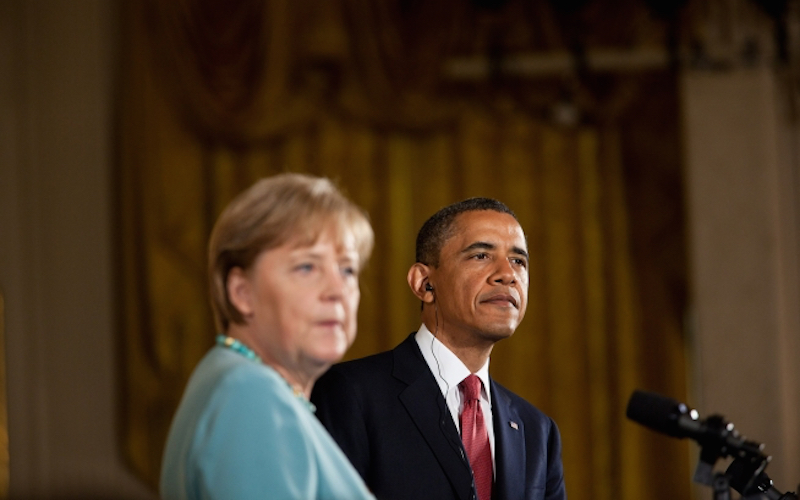
Obama and Europe: The Cost of Coolness
Earlier posts have criticized President Obama for his minimalist foreign policy vision (here and here) and lack of leadership skills. But it’s also worth noting that some of his multiplying problems overseas have to do with his aloof personality and inability to forge strong personal relationships with international counterparts. I’ve highlighted this deficiency before and connected it to the stark deterioration of U.S.-Afghan relations. But further evidence came a few weeks ago when former German defense minister Karl-Theodor zu Guttenberg told CNN’s Christine Amanpour that Mr. Obama is “probably the most detached president [in] decades” and is “not seemingly capable to communicate properly on an eye-to-eye level with other heads of state.” Speaking of the current turbulence in U.S.-German affairs, Guttenberg noted that there is “a level of mistrust that needs to be fixed, and it needs to be fixed from Washington.”
We’ve heard this complaint before from Berlin. In a comment piece last fall, Roger Cohen at the New York Times reported that:
…Germany [is] incensed by what it has perceived as a dismissive U.S. attitude. A senior official close to [German Chancellor Angela] Merkel recently took me through the ‘very painful’ saga of the Obama administration’s response to Syrian use of chemical weapons. It began with Susan Rice, the national security adviser, telling the Chancellery on Aug. 24 that the United States had the intelligence proving President Bashar al-Assad’s use of chemical weapons, that it would have to intervene and that it would be a matter of days. German pleas to wait for a United Nations report and to remember Iraq fell on deaf ears. Six days later, on Friday Aug. 30, Germany heard from France that the military strike on Syria was on and would happen that weekend — only for Obama to change tack the next day and say he would go to Congress.
Things got worse at the G-20 St. Petersburg summit meeting the next week. Again, Germany found the United States curtly dismissive. It wanted Germany’s signature at once on the joint statement on Syria; Germany wanted to wait a day until a joint European Union statement was ready and so declined. ‘The sense from Rice was that we are not interested in your view and not interested in the E.U. view,’ the official said. ‘We left Petersburg very offended. This is not what you want your best partner to look like.’
Similarly, a few weeks later John Vinocur, the former executive editor of the International Herald Tribune, quoted a senior European security official as saying that Mr. Obama “does not do consultation, and he doesn’t do discussion with allies. He reports, and he describes his analytical process.” Vinocur also noted that a biography published last summer about German leader Angela Merkel describes her as regarding Obama as inscrutable – someone “so peculiar, so unapproachable, so lacking in warmth.”
An article in Der Spiegel last fall told the same story. It reported that: “During a recent visit by a European head of government to Washington, the atmosphere was described as frosty by those in the entourage from Europe. Obama didn’t find the time for even a little small talk, the sources said, and ‘it seemed to some like an appointment with a lawyer.’”
There is a heavy dose of irony at work here. Six years ago, the claim by then- presidential candidate Barack Obama to be the “anti-Bush” guaranteed him a euphoric welcome in Berlin in July 2008. Speaking before a massive crowd assembled in the “Tiergarten” (speech text here; video here), he grandly vowed to “remake the world once again,” this time in a way that allies would “listen to each other, learn from each other and, most of all, trust each other.” A year later, this sort of rhetoric garnered him a Nobel Peace Prize for single-handedly creating “a new climate in international politics” and restoring multilateral diplomacy to “a central position.”
Once in office, however, President Obama quickly went about signaling his disinterest in America’s European allies. He skipped out on a November 2009 meeting with European Union leaders at the White House, conspicuously assigning the hosting duties to Vice President Joe Biden. Reports (examples here, here and here) were soon circulating that British Prime Minister Gordon Brown and French President Nicolas Sarkozy – the latter being the most pro-American leader in Paris in decades – felt they were being ignored.
In early 2010, Obama once again missed a summit meeting with EU leaders. So great was the ensuing uproar that he arranged for a get-together later that year. But the chosen venue – an otherwise vacant building in Lisbon that lacked electrical power – did little to reassure his European counterparts. Observing the noticeable difference in style between Mr. Obama and his predecessor, who was reviled by foreign publics but still took the time to build relationships with leaders abroad, Jackson Diehl at theWashington Post warned four years ago that “coolness has its cost.”
Fast forward 18 months into Mr. Obama’s second term and U.S. relations with Europe seem to have come full circle from where they stood in the acrimonious run-up to the 2003 U.S. war with Iraq, when Bush administration officials disparaged America’s traditional allies on the continent as “Old Europe.” The percentage of Germans who saw the United States in a positive light back then (45 percent) is not far from today’s figure (51 percent). And in another survey released two months ago, only 38 percent of Germans saw the US as a “trustworthy partner” – the lowest level in the Obama period.
True, a good deal of the current trust deficit in U.S.-German relations can be explained by the outrage in the past year over U.S. intelligence activities, both the National Security Agency’s surveillance of digital communications, including Mrs. Merkel’s personal cell phone, and the Central Intelligence Agency’s spying on the German intelligence service and defense ministry. The latter development prompted Berlin a few weeks ago to expel the CIA station chief in Germany, an extraordinary act by a long-standing U.S. ally. But much of the current ruction between Washington and Berlin is also due to the lack of a personal connection between Mr. Obama and Mrs. Merkel. Indeed, the German leader is reportedly telling people in her circle that she misses George W. Bush.
Beyond the surfeit of irony, there are real-world consequences to how the Obama administration has mismanaged relations with Europe. Speaking earlier this year before a European audience, Secretary of State John Kerry reassuringly called for “a transatlantic renaissance” entailing “a new burst of energy and commitment and investment in the three roots of our strength: our economic prosperity, our shared security, and the common values that sustain us.” This message was decisively undercut less than a week later, however, when a leaked phone conversation featured Victoria Nuland, the Assistant Secretary of State for European Affairs, graphically cursing the EU’s diplomatic efforts in the Ukraine crisis.
President Obama also called for a renewal of Atlantic relationships during his trip to Europe earlier this year, and he has been busy these days trying to rally a common Western position on the Ukraine conflict. But he shouldn’t be surprised that consensus is hard to come by when he has spent so little effort trying to find personal rapport with the continent’s leaders. This lesson also applies to the Middle East, where Mr. Obama has a famously testy relationship (see here, here and here) with Israeli Prime Minister Benjamin Netanyahu. The upshot is that during the current round of Gaza fighting, Israel has come to trust the new military-led regime in Egypt more than the Obama administration. Indeed, the Wall Street Journal reports that Netanyahu’s mistrust is so great that is trying to cut Washington out of the ceasefire negotiations.
In closing, it’s worth mentioning a new piece by Michael Hirsh, the national editor at Politico magazine, who argues that the nature of Mr. Obama’s golf game says a lot about his insular personality. “In five and a half years of slashing his way through courses from Maryland to Hawaii,” he writes, “the president has managed to turn the most gregarious of games into an intensely private obsession” that is only shared with a “routinely narrow choice of playing partners.” Hirsh also notes that due “in large part to his sudden and meteoric rise, Obama also never had to learn the basic skills of socializing” with his political peers.
A constant thread running throughout Mr. Obama’s presidency is his inability to cultivate strong personal ties with other leaders, whether on Capitol Hill or in foreign chancelleries. Recent events in Europe and elsewhere have once more underscored the consequences of this deficiency.

